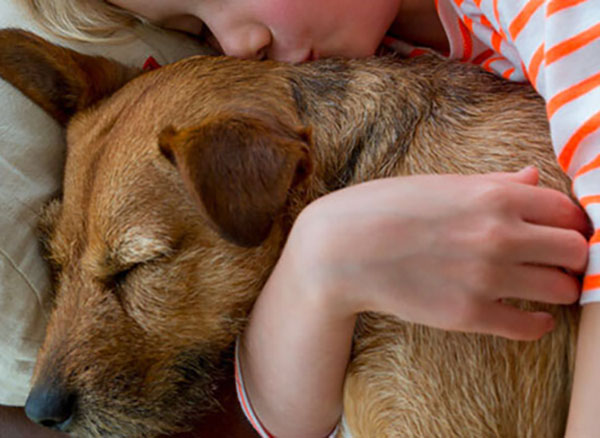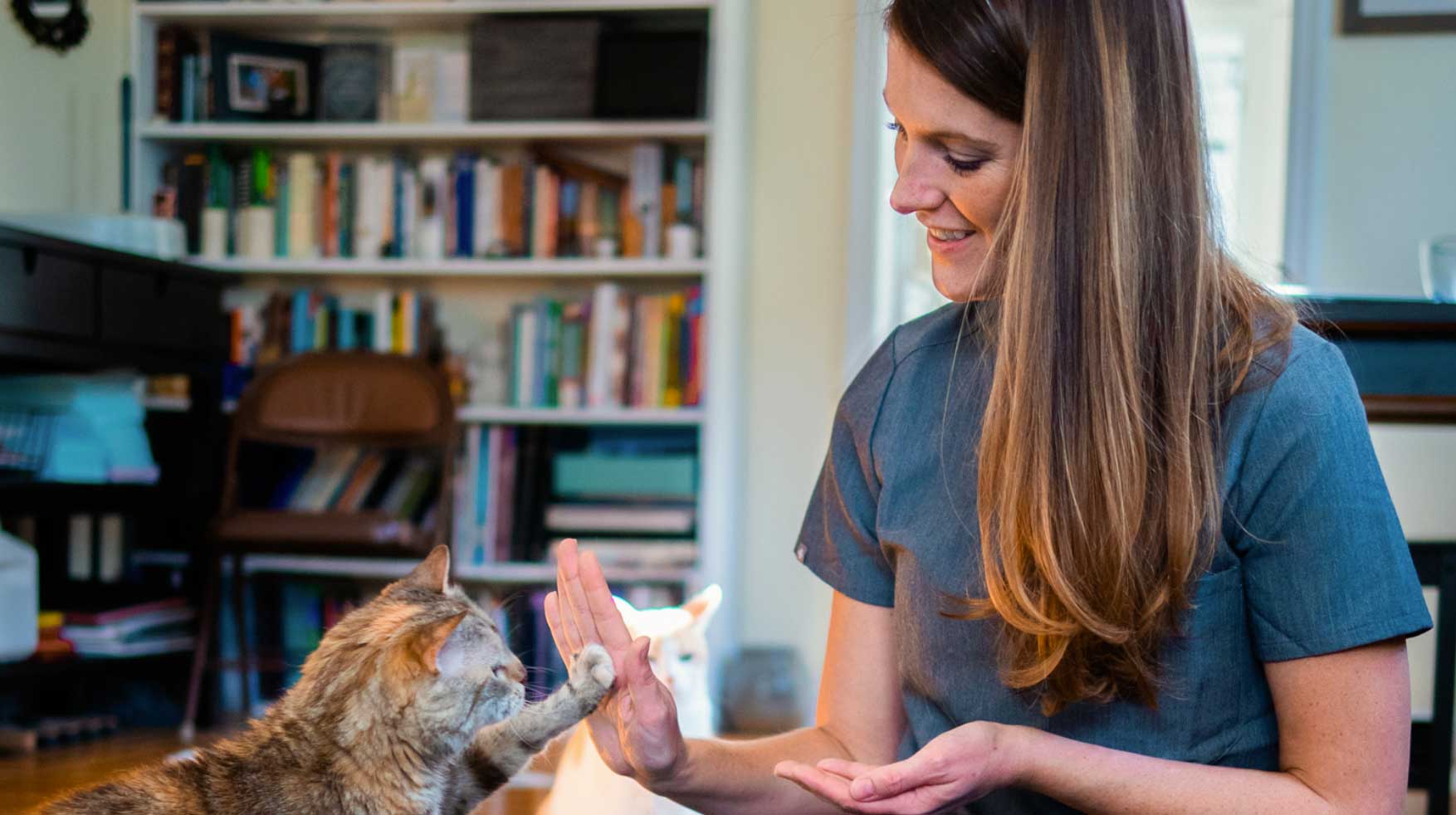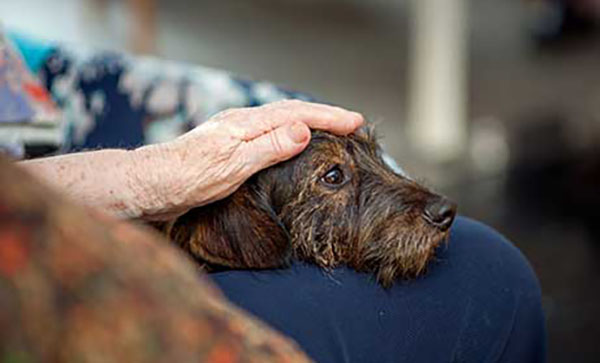We know that every pet's journey is unique.
In-home euthanasia services.
- Unhurried appointment with a personal experience and the opportunity to discuss questions or concerns
- Paw print memorial and fur clipping included
- Aquamation, or water-based cremation, is a form of eco-friendly aftercare for pets, with only 10% of the carbon footprint of flame-based cremation.
- It is a process that uses warmed flowing water and alkalinity, resulting in the reduction of body mass to ash.
- If you choose individual cremation, your pet is cremated individually and ashes are returned in your choice of cedar urn or velvet bag.
- Individual Aquamation 0-49lbs - $299
- Individual Aquamation 50-99lbs - $340
- Individual Aquamation 100-150lbs - $395
- Individual Aquamation 150+lbs - $445
- If you choose communal cremation, your pet is cremated with other pets and placed in a communal burial lot at a local pet cemetery.
- Communal Aquamation 0-49lbs - $235
- Communal Aquamation 50-99lbs - $245
- Communal Aquamation 100-150lbs - $270
- Communal Aquamation 150+lbs - $320
- Additional Clay Paw - $30
- Ink Prints - $30
- Shipping - Aquamation - $35
What can I expect?
The right kind of care for the best rest of life.
In-home comfort care services.
Pet comfort care aims to meet the physical and mental needs of a pet faced with quality of life issues related to aging, pain or life-limiting illness.
A medical consultation by our trained veterinarian includes:
- Comprehensive review of your pet’s medical records
- One month of medical management, communication and plan adjustments with your dedicated BluePearl Pet Hospice care team
- Family education and review of home care routines, including diet
- Review of your pet’s environment to increase comfort
- Support from your pet’s dedicated care team available seven days a week
- Discussion of disease concerns and what to anticipate as disease progresses
- Discussion about your pet’s health, quality of life, nursing care, potential environmental improvements, and the plan and timing for euthanasia
- Written summary of your consultation emailed to you and your veterinarian
- This visit does not include the dispensing of medications or ongoing management of your pet’s care. If this is needed, a Comfort Care Consultation is recommended.
- Discussion about health concerns, your pet’s quality of life, nursing care, potential environmental improvements, and the plan and timing for euthanasia
- Recorded video consultation with a secure link so you can rewatch any time and review recommendations with your family
- Written summary of your consultation emailed to you and your veterinarian
- If you have questions about your pet’s disease or medical care options, call us to schedule an In-Home Comfort Care Consultation with one of our veterinarians
Laser therapy offers a fast-acting, non-invasive, therapeutic treatment for a wide variety of conditions. Decreased inflammation, decreased pain and accelerated healing is achieved when a sufficient dose of light energy reaches the target tissue.
Therapy can be implemented for:
- Dental procedures
- Infections
- Sprains
- Post-surgical care
- Osteoarthritis
- Fractures
- Inflammatory bowel disease
- Wounds
- Degenerative joint disease
- A variety of skin conditions
An In-Home Comfort Care Consultation with one of our veterinarians is required to begin laser therapy.
What can I expect?
Meet our veterinarians.
Janet Meeks
DVMDr. Janet is honored to help families through some of the most difficult times regarding end of life and hospice care. She feels it is a true calling to be able to provide comfort, peace and understanding to families and their beloved pets.
- Internship, Food Animal and Ambulatory Medicine, Mississippi State College of Veterinary Medicine, Starkville, MS
- Doctor of Veterinary Medicine, Louisiana State University School of Veterinary Medicine, Baton Rouge, LA
- Bachelor of Science, Biology Pre-Med and Chemistry, Loyola University, New Orleans, LA
Dr. Janet enjoys spending time with her partner, Russell, and their three dogs, Gator, Bilbo Waggins and Saint. Originally from Louisiana, she is excited to explore Houston and all it has to offer culturally and gastronomically.
Emma Brawn
DVMDr. Emma Brawn is dedicated to helping families navigate the emotions and decisions needed when it comes to end of life care. She takes the time to listen and understand the needs of both the two-legged and four-legged members of the family and develop a plan to support all of them through a difficult time.
- Doctor of Veterinary Medicine, University of Illinois, Champaign-Urbana
- Bachelor of Science, University of Illinois, Champaign-Urbana
Dr. Brawn lives with her husband, four kids, two dogs, two cats and two snakes. When she isn’t running a scout meeting, driving kids to their various sports and music practices she enjoys reading, baking and puzzles.
Erica Sandberg
DVM, CHPVDr. Erica Sandberg’s medical interests include pain management, palliative care and hospice care. She enjoys collaborating with other veterinarians to provide exceptional care for geriatric and ill pets and their families.
- Doctor of Veterinary Medicine, Texas A&M University, College Station
- Bachelor of Arts, Biological Sciences, Marine Sciences, Smith College, Northampton, MA
Dr. Sandberg enjoys exercise, music, art, reading and spending time with her family and friends. She lives with her husband, two children, a Dachshund mix named Millie, and a Guinea Pig named Brownie.
Melissa McNeil
DVMDr. Melissa McNeil enjoys all aspects of companion animal medicine but became particularly interested in senior care when her Great Dane, Indy, entered his golden years. He experienced many of the same concerns as other large breed senior dogs: arthritis, age related dementia and keeping him comfortable and happy allowed them several extra years of beautiful memories. When the time came, the ability to allow him to pass at home peacefully was a true gift that Dr. McNeil is passionate about giving to other patients and their families.
- Internship, Exotic Animal Medicine, Center for Bird and Exotic Animal Medicine, Bothell, Washington
- Doctor of Veterinary Medicine, Texas A&M University, College Station
- Bachelor of Science, Biomedical Science, Texas A&M University, College Station
Dr. McNeil enjoys running, baking, traveling, gardening (sometimes to the plants’ detriment) and reading. Currently, she shares her home with Renfri the golden mutt, Queenie the cat and various foster rabbits and guinea pigs.
Testimonials from our clients.
"I would highly recommend using Pet Hospice. I had an amazing team to work with and they helped make a tough time, just a little bit less tough."
"They provided so much comfort during an unexpectedly traumatic time. Everyone was so respectful, compassionate, sensitive, and thoughtful to our needs ... even the ones we didn't realize we had."
"Since all the care is based out of home, Bruce was much more comfortable and relaxed. We were able to put stress to side and get him the best care possible."
Frequently asked questions.
You can feed your pet or offer favorite treats if he or she is eating.
On rare occasions, nausea can happen following sedation, but this is generally due to either your pet’s underlying disease process or sensitivity to medication, not the fact that you let your pet enjoy a favorite treat or meal.
The only medications we recommend you give your pet on the day of euthanasia are “comfort medications” such as pain or anti-nausea medications, if you are giving them, and they will not interfere with the euthanasia process.
Children should ideally have the opportunity to say goodbye to their companion. In our experience, children over five years old are amazingly present and engaged, and will often impress with their understanding and acceptance.
Of course, this decision is ultimately the choice of the parent. Some parents elect to have children at home but in a different room for the actual passing. This helps ensure they are insulated from the parent’s emotions (which is usually harder for them to deal with than the actual loss of the pet), but still allow them to say their goodbyes after the passing, before the pet leaves the home.
For children younger than five, they seem to be unsure about what’s going on and are, again, more upset by the parent’s emotions than by the loss of the pet. Still, we believe open communication about the loss is usually the best policy even for this age.
Upon request, our care coordinators can email you a helpful resource from The Ohio State University that shares how to best help children cope with serious illness or death of a pet.
- We will care for every possible need so that your only focus is being with your pet.
- We provide soft blankets, “potty pads,” and arrange for a paw print to be made by the crematorium.
- We care for all of your pet’s cremation and transportation arrangements, and provide a stretcher that allows for the gentle movement of pets from their home to our vehicle.
- We notify your veterinarian(s) so that you do not need to make that difficult call.
We understand that new people can be intimidating and that some pets experience “stranger danger.”
In the situation where a pet may be extra nervous, or potentially prone to biting, please let our care coordinators know. We will work with you to develop a specialized approach, helping to remove any anxiety or fear and in turn making these moments as stress-free as possible for both you and your pet.
In our experience, we find other household pets absolutely need this time to say goodbye, just like any family member.
Most pets seem to understand what is going on, and will sit quietly and attentively, honoring the process much in the same way as you do. If you feel your pet may be disruptive to the process, they can be placed in another room and allowed to say goodbye once their friend has passed.
Being able to see and smell their friend allows for closure, which is important in the grieving process. Following the loss of their friend, they may act depressed for a day or so after, but generally return to their normal behaviors and routines following this time. We offer as much time as needed for all members of the family to say their goodbyes.
- Nursing care education
- Assessment of the home environment
- In-home diagnostics such as blood work, urinalysis and blood pressure monitoring
- Preparation and planning for emergencies
- Nutrition counseling
- Facilitating end-of-life decisions
- Consultation: When should we consider euthanasia? What is the best way to plan for this time?
- Pet loss support focused on anticipatory grief
- Cohesive and collaborative care with your veterinarian and veterinary specialists
No, a Comfort Care relationship is appropriate at any stage of disease, and the sooner the relationship is started, the better.
The sooner Comfort Care is started, the more you and your pet can benefit. It is proactive care that can start at any stage of disease to greatly improve comfort and quality of life for months or years.
- A progressive disease such as arthritis, kidney disease or heart failure
- An incurable illness, such as cancer
- A disease for which you do not wish to pursue additional diagnostics, surgery or other therapies in lieu of comfort-oriented care
- A disease for which you do wish to pursue additional treatments (such as chemotherapy) but would benefit from additional support
- A long-term disability such as poor mobility, neurological disorders or disc disease
- “Old age” issues such as a general slowing down, nighttime anxiety or cognitive dysfunction (“doggy dementia”)
A “Comfort Kit” is something we dispense to our comfort care families when we are concerned that an emergency might happen, such as sudden distress or pain.
A Comfort Kit includes several pre-loaded syringes of a pain medication plus a sedative that families can give by subcutaneous (under the skin) injection in the case of an emergency. This easily administered injection provides both pain relief and sedation, and reduces any feelings of discomfort or distress.
A Comfort Kit provides relief not just for the pet, but for the family as well. For example, if a sudden crisis were to occur in the middle of the night, families would have on hand an intervention that will provide comfort until the vet arrives for euthanasia or reevaluation, or to provide comfort while en route to an emergency hospital if care is needed in the middle of the night.



